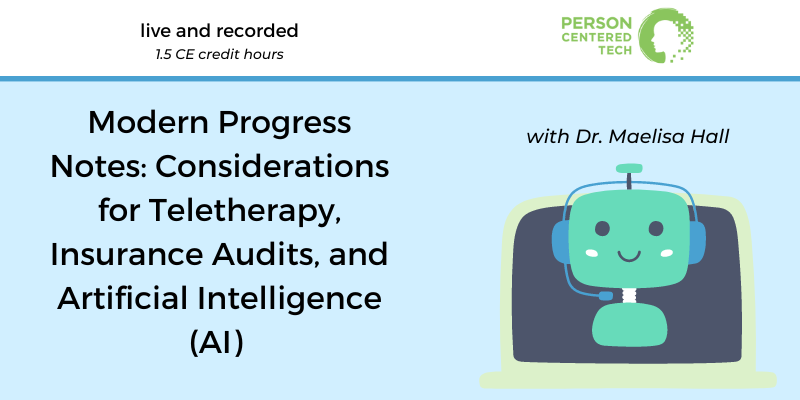1.5 CE Credit Hour Presentation on Documentation and A.I.
Modern Progress Notes: Considerations for Teletherapy, Insurance Audits, and Artificial Intelligence (AI)
The rapid changes inherent to using technology as a mental health professional can be overwhelming.
Modern documentation requires adaptivity and new strategies to manage things like electronic records, insurance audits, teletherapy sessions, and even artificial intelligence (AI).
But what is ethical, safe and wise to implement in your practice?
Join Dr. Maelisa McCaffrey (Hall) of QA Prep to address common considerations and learn new strategies for coping with notes in our modern era.
On-Demand Self Study
The rapid changes inherent to using technology as a mental health professional can be overwhelming
Learn from Dr. Maelisa Hall about the common mistakes clinicians make in modern documentation and learn simple and easy to implement strategies for overcoming these mistakes. Lastly, you’ll be presented with a thought rubric that you can use for evaluating the appropriateness of various technologies and techniques in the anticipation that practices continue to change at this rapid pace.

Included Resources:
-
Collaborative documentation tips
-
Progress statement formula and examples
-
Sample progress notes for insurance (intake and therapy session)
-
Using AI checklist
Real feedback from the live event:
“PCT on the forefront of accurate info, yet again!”
“Every bit of this was fantastic and just what I needed at this very moment!”
“The course was convenient in navigation, efficient and greatly informative.”
“I’ve followed Maelisa’s content online for years. Great presenter with solid, quality content delivered in an informative and non-shaming manner. Excellent!”
Who is this event for?
This course is designed for solo practitioners, group practice leaders, and group practice clinical staff members. It is also suitable for practices that consist of 100% in-person, 100% telehealth, or a mixture of in-person and telehealth treatment.
 In-person Practices
In-person Practices
 Hybrid Practices
Hybrid Practices
 Teletherapy Only Practices
Teletherapy Only Practices
This introductory-level course for counselors, marriage and family therapists, psychologists, and clinical social workers.

Thank you for the information and for making it so accessible. Somehow you take the driest material and make it fun and immediately relevant. You folks knock it out of the park!
Strategies for Collaborative Documentation
Identify three strategies for using collaborative documentation principles to improve both efficiency and client rapport in teletherapy
Insurance and Notes
Define medical necessity and how it specifically applies to progress notes in psychotherapy
Reduce Audit Risk
Describe the two most common reasons for insurance audits and how to avoid these using accurate documentation

Impact of AI (Artificial Intelligence) on notes
Use a thought rubric to determine the potential ethical conflicts and appropriateness of using AI for documentation
Training is Step 2 of the PCT Way.

Course Details
1.5 CE Credit Hour. Self-study, on-demand CE training.
Title: Modern Progress Notes: Considerations for Teletherapy, Insurance Audits, and Artificial Intelligence (AI)
Authors/Presenters: Dr. Maelisa McCaffrey (Hall)
CE Length: 1.5 CE credit hours, legal-ethical
Legal-Ethical CE Hours: 1.5 legal-ethical CE hour
Educational objectives:
- Identify three strategies for using collaborative documentation principles to improve both efficiency and client rapport in teletherapy
- Define medical necessity and how it specifically applies to progress notes in psychotherapy
-
Use a thought rubric to determine the potential ethical conflicts and appropriateness of using AI for documentation
-
Describe the two most common reasons for insurance audits and how to avoid these using accurate documentation
Syllabus:
- Introductions
- Documentation and teletherapy
- Progress notes in “real life” using teletherapy
- Collaborative documentation as an ethical and efficient strategy
- Considerations for your EHR
- Medical necessity in progress notes
- Red flags for insurance audits
- Common misconceptions about insurance audits
- How AI is currently being used in documentation
- Thought rubric for ethical dilemmas in technology
- Staying ethical and staying relevant
Register
Modern Progress Notes: Considerations for Teletherapy, Insurance Audits, and Artificial Intelligence (AI)
Meet Our Presenter
Presented by
Dr. Maelisa McCaffrey (Hall)

Dr. Maelisa McCaffrey (Hall) is a licensed psychologist, nail design enthusiast, and multi-passionate entrepreneur. With her business QA Prep, she empowers therapists through trainings and consultation on clinical documentation. Maelisa focuses on the “why” behind the usual recommendations and encourages clinicians to think outside the box, while also keeping their ethics intact. A true ENFP, Maelisa aims to make sure all of her endeavors are meeting a need in the community while also allowing for plenty of laughter and fun.
Website/Business Links:
QA Prep https://www.qaprep.com/
Resources & Citations:
– American Psychological Association. (2017). Ethical principles of psychologists and code of conduct. Washington, DC: Author.
– American Psychological Association. (2009). Criteria for the Evaluation of Quality Improvement Programs and the
– Use of Quality Improvement Data. American Psychologist. September Vol 64 Number 6, Pages 551-557.
– Griswold, B. (2018) Navigating the Insurance Maze: The Therapist’s Complete Guide to Working with Insurance-
– And Whether You Should, 7th Ed.
– Luepker, E.T. (2012) Record Keeping in Psychotherapy and Counseling. New York, NY: Routledge, Taylor and
– Francis Group.
– Schwitzer, A.M. & Rubin, L.C. (2015) Diagnosis & Treatment Planning Skills. Thousand Oaks, CA: SAGE Publishing.
– Sutton, R. (2016) The Counselor’s STEPs for Progress Notes. San Bernardino, CA: Self Published.
– US Dept. of Health and Human Services. (2006). HIPAA Administrative Simplification . Washington, DC: Author.
– US Dept. of Health and Human Services. (2013). HIPAA Omnibus Final Rule . Washington, DC: Author.
– Wiger, D.E. (2012) The Psychotherapy Documentation Primer, 3rd Edition. Hoboken, NJ: John Wiley & Sons, Inc.
– Zuckerman, E.L. and Kolmes, K. (2017) The Paper Office for the Digital Age. New York, NY: The Guilford Press.
Accuracy, Utility, and Risks Statement:
This program discusses strategies for complying with HIPAA and some other US Federal rules. It may not include information on all applicable state laws. Misapplication of the materials, or errors in the materials, could result in non-compliance with applicable laws or ethics codes.
Conflicts of Interest: None stated.
Commercial Support: none.
